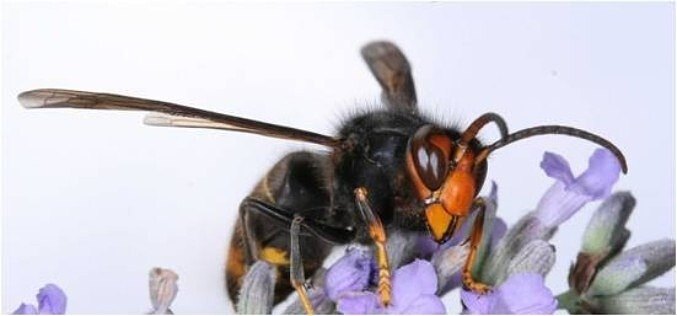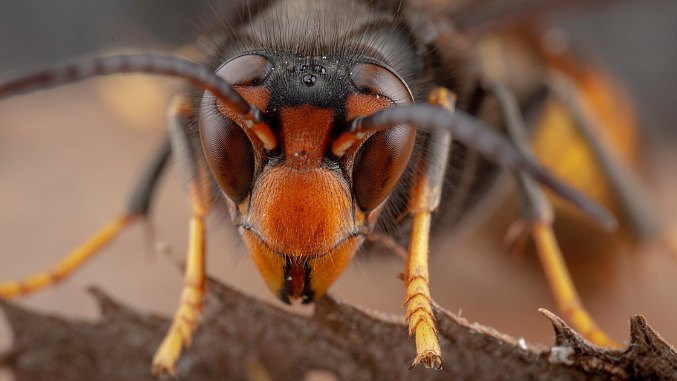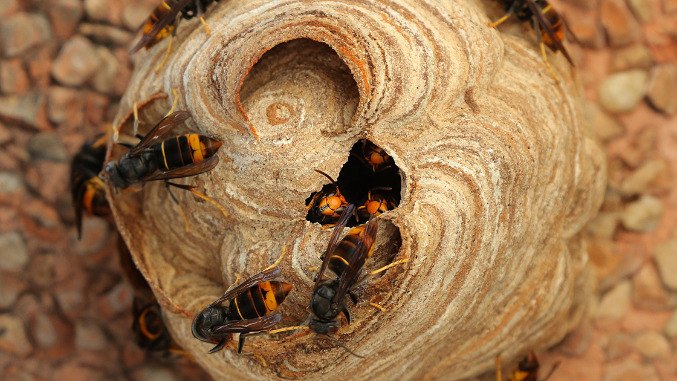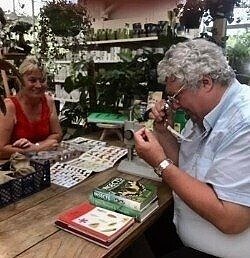
Defending British bees against the invasive Asian hornet
3 Minute Read
Dr Ian Bedford tells us everything we need to know about the 'bug of the month' for July, Asian Hornets.What are asian hornets?
Over the past two decades, European countries have been trying to prevent the appearance and spread of the Asian Hornet, (Vespa velutina),an invasive wasp that originates from the Far East. The primary concern being that, unlike Europe’s native wasps, the Asian hornet is a specialist predator of bees, particularly honeybees, so it poses a significant threat to European apiculture.Especially since European honeybees are defenceless against Asian Hornets, which often results in hives being totally destroyed. Interestingly though, some honeybees, such as those in Japan, have evolved a defence strategy against their predatory Hornet, the Giant Asian Hornet (Vespa mandarinia), which involves overpowering and killing the first hornet to find their hive. They then kill this scouting hornet by smothering it and generating a lethal temperature by friction.
Unfortunately, this doesn’t happen with European honeybees and so, the hornet scout, it will return to the nest, where it signals the location of the honeybee hive. Worker hornets will then fly off and attack the honeybees as they return from foraging, catching them mid-flight and decapitating them before taking the headless bodies back to their nest, where they are fed to their young.
However, despite a concerted effort to eradicate or contain Asian Hornets since appearing in Europe, they have now spread across France and onto Spain & Portugal, with reports also indicating a presence in Belgium, Italy, Germany and the Channel Islands, and are predicted to spread further within Continental Europe and to surrounding islands, including the British Isles, in the coming years.

Image via NNSS, courtesy of Jean Haxaire.

No matter what time of year an Asian hornet might be spotted, it will need to be reported to either the NNSS website or to a member of the local beekeeper’s association, especially during the summer months. The most

Identifying Asian Hornets
Report sightings:
• With the iPhone or Android app:
Asian Hornet Watch
• Online, here
• By email: alertnonnative@ceh.ac.uk
ASIAN HORNET ID
Report sightings:
• With the iPhone or Android app:
Asian Hornet Watch
• Online, here
• By email: alertnonnative@ceh.ac.uk
ASIAN HORNET ID
Asian Hornet Factsheet
Losses of commercial (large- or small-scale) honeybee products. Possible costs due to replacement of damaged colonies. Costs, including time, associated with searching for, and destroying, queens and nests.
ASIAN HORNET FACTSHEET
Losses of commercial (large- or small-scale) honeybee products. Possible costs due to replacement of damaged colonies. Costs, including time, associated with searching for, and destroying, queens and nests.
ASIAN HORNET FACTSHEET

About Dr Ian Bedford
Ian has been fascinated by the bug world for as long as he can remember. From studying butterflies on the South Downs as a youngster, he went on to pursue a career in Research Entomology and ran the Entomology Dept at the John Innes Centre in Norwich up until his recent retirement. Ian now works as an independent entomologist offering advice to companies developing environmentally safer plant protection products.Visit website

'Bug of the Month'
Welcome to 'Bug of the Month' with Dr Ian Bedford.Every month Ian will shares his knowledge on how to protect your plants and gardens from preventable pest invasions while providing valuable insights into the insects regularly found in our gardens.
Read more
Comments (0)
Why not be the first to send us your thoughts?
Leave A Comment
Most popular articles
1
Plastic plant pots dimensions and uses2
Peat vs Peat Free - Choosing the right Potting Compost3
How to Grow Watercress at home in plant pots4
January Jobs5
Our guide to seed sowing compost